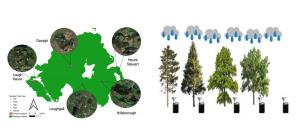A team of scientists from the Agri-Food and Biosciences Institute (AFBI), led by Dr Kirsty McLaughlin, has successfully used environmental DNA (eDNA) as a novel and non-invasive method for detecting plant pathogens in Northern Ireland's forests. Their research promises to enhance AFBI and DAERA’s ability to monitor the health of forests and improve the early detection of harmful pathogens that threaten forests and the biodiversity within them.

A team of scientists from the Agri-Food and Biosciences Institute (AFBI), led by Dr Kirsty McLaughlin, has successfully used environmental DNA (eDNA) as a novel and non-invasive method for detecting plant pathogens in Northern Ireland's forests. Their research promises to enhance AFBI and DAERA’s ability to monitor the health of forests and improve the early detection of harmful pathogens that threaten forests and the biodiversity within them.
Traditional methods of detecting plant diseases often rely on visual inspections and laboratory analyses, which can be time-consuming and may miss pathogens that are present in low concentrations. The novel study by Dr McLaughlin's team was funded through DAERA’s Plant Health Evidence & Innovation Programme and suggests that eDNA, which is DNA collected from environmental samples such as soil, water, or air, can offer a more efficient alternatives for identifying pathogens, even in the absence of visible symptoms.
By sampling rainwater from various forest sites across Northern Ireland, the team was able to detect traces of DNA from a range of plant pathogens, including those that cause devastating diseases in trees and plants. The study demonstrated that eDNA is effective in identifying pathogens, potentially allowing for more rapid responses and mitigation efforts.
Dr McLaughlin commented: "Our research provides compelling evidence that eDNA could be a game-changer in forest health surveillance. By using this method, we could track pathogens in real time and potentially prevent outbreaks before they spread. This could have significant implications for forest conservation and management, not only in Northern Ireland but globally."
This groundbreaking work is part of an ongoing effort to safeguard Northern Ireland's biodiversity and to ensure the resilience of its forests in the face of climate change and emerging plant diseases.
Part of this exciting work has recently been published in the open access journal ‘Forests’.
Notes to editors:
AFBI is an arms-length body of DAERA delivering research and development, diagnostic and analytical testing, emergency response capability and expert scientific advice for DAERA and other government departments, public bodies and commercial companies in Northern Ireland, and further afield.
AFBI’s Vision is “Scientific excellence delivering impactful and sustainable outcomes for society, economy and the natural environment”.
AFBI’s Purpose is to deliver trusted, independent research, statutory & surveillance science, and expert advice that addresses local and global challenges, informs government policy and industry decision making, and underpins a sustainable agri-food industry and the natural and marine environments.
AFBI’s strategic priorities:
- Leading improvements in the agri-food industry to enhance its sustainability;
- Protecting animal, plant and human health;
- Enhancing the natural and marine environment;
- Delivering quality outcomes and impact;
- Enabling world class science through excellence in people, places & technology.
Latest news
- AFBI Showcases the impact of its Science at this year’s Balmoral Show 29 April 2025
- Finding the needle in a haystack: eDNA as a Surveillance Tool for Plant Pathogens in Northern Irish Forests 23 April 2025
- AFBI issues Nematodirus warning – Spring 2025 11 April 2025
- Managing Nature Based Risks to the UK Economy and Opportunities for Green Finance 08 April 2025
